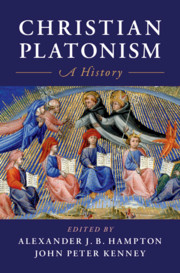Book contents
- Christian Platonism
- Christian Platonism
- Copyright page
- Dedication
- Contents
- Figures
- Contributors
- Acknowledgements
- I Concepts
- II History
- 2.1 The Bible and Early Christian Platonism
- 2.2 Platonism and Christianity in Late Antiquity
- 2.3 Christian Platonism in the Medieval West
- 2.4 Christian Platonism in Byzantium
- 2.5 Renaissance Christian Platonism and Ficino
- 2.6 Northern Renaissance Platonism from Nicholas of Cusa to Jacob Böhme
- 2.7 Christian Platonism in Early Modernity
- 2.8 Christian Platonism in the Age of Romanticism
- 2.9 Christian Platonism and Modernity
- III Engagements
- Index
- References
2.5 - Renaissance Christian Platonism and Ficino
from II - History
Published online by Cambridge University Press: 20 January 2021
- Christian Platonism
- Christian Platonism
- Copyright page
- Dedication
- Contents
- Figures
- Contributors
- Acknowledgements
- I Concepts
- II History
- 2.1 The Bible and Early Christian Platonism
- 2.2 Platonism and Christianity in Late Antiquity
- 2.3 Christian Platonism in the Medieval West
- 2.4 Christian Platonism in Byzantium
- 2.5 Renaissance Christian Platonism and Ficino
- 2.6 Northern Renaissance Platonism from Nicholas of Cusa to Jacob Böhme
- 2.7 Christian Platonism in Early Modernity
- 2.8 Christian Platonism in the Age of Romanticism
- 2.9 Christian Platonism and Modernity
- III Engagements
- Index
- References
Summary
Ficino’s Christian Platonism is characterized by two overriding features. First, it is expressed in works that are elaborated along traditional medieval lines in the form of commentaries either standing alone or incorporated into writings in other genres. Second, the configuration of this Platonism is inseparable from the history of Platonism as a tradition embodying both a continuous progress towards the light and a rhythmic alternation of revelation and concealment. After exploring this material in detail, it will become clearer how Ficino’s Christian Platonism is at the same time a psychology and a theology grounded in a sort of two-directional hermeneutic. Plato the non-Christian writer is prophetic of his own reading by later non-Christian Platonists who acquired the possibility of this reading on the one hand, through their partial illumination by Christian intermediaries and on the other, through their judicious distinction between the literal truth and non-literalness of some of the master’s most important teachings.
- Type
- Chapter
- Information
- Christian PlatonismA History, pp. 227 - 245Publisher: Cambridge University PressPrint publication year: 2020

